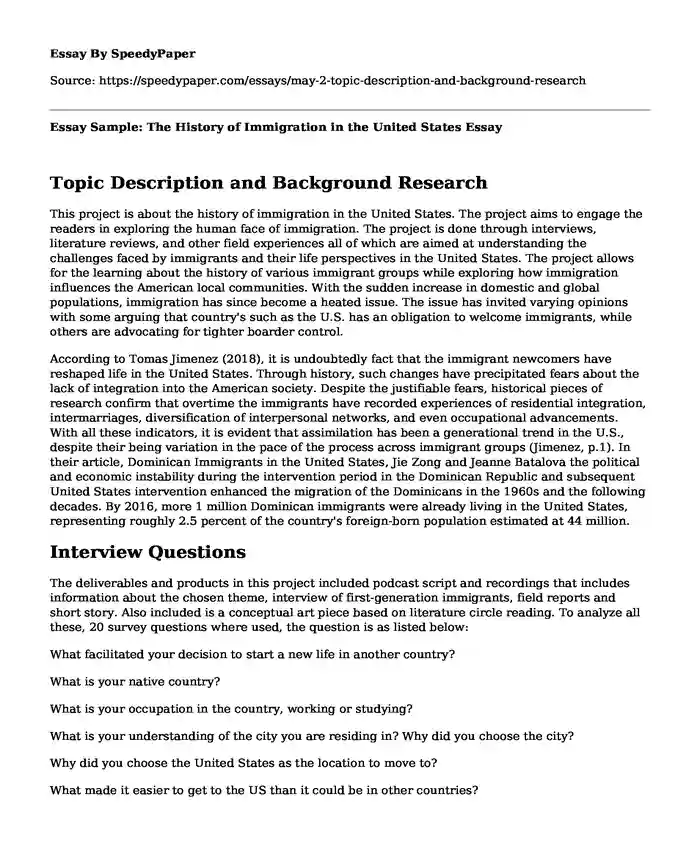
| Type of paper: | Essay |
| Categories: | United States Immigration |
| Pages: | 4 |
| Wordcount: | 826 words |
Topic Description and Background Research
This project is about the history of immigration in the United States. The project aims to engage the readers in exploring the human face of immigration. The project is done through interviews, literature reviews, and other field experiences all of which are aimed at understanding the challenges faced by immigrants and their life perspectives in the United States. The project allows for the learning about the history of various immigrant groups while exploring how immigration influences the American local communities. With the sudden increase in domestic and global populations, immigration has since become a heated issue. The issue has invited varying opinions with some arguing that country's such as the U.S. has an obligation to welcome immigrants, while others are advocating for tighter boarder control.
According to Tomas Jimenez (2018), it is undoubtedly fact that the immigrant newcomers have reshaped life in the United States. Through history, such changes have precipitated fears about the lack of integration into the American society. Despite the justifiable fears, historical pieces of research confirm that overtime the immigrants have recorded experiences of residential integration, intermarriages, diversification of interpersonal networks, and even occupational advancements. With all these indicators, it is evident that assimilation has been a generational trend in the U.S., despite their being variation in the pace of the process across immigrant groups (Jimenez, p.1). In their article, Dominican Immigrants in the United States, Jie Zong and Jeanne Batalova the political and economic instability during the intervention period in the Dominican Republic and subsequent United States intervention enhanced the migration of the Dominicans in the 1960s and the following decades. By 2016, more 1 million Dominican immigrants were already living in the United States, representing roughly 2.5 percent of the country's foreign-born population estimated at 44 million.
Interview Questions
The deliverables and products in this project included podcast script and recordings that includes information about the chosen theme, interview of first-generation immigrants, field reports and short story. Also included is a conceptual art piece based on literature circle reading. To analyze all these, 20 survey questions where used, the question is as listed below:
What facilitated your decision to start a new life in another country?
What is your native country?
What is your occupation in the country, working or studying?
What is your understanding of the city you are residing in? Why did you choose the city?
Why did you choose the United States as the location to move to?
What made it easier to get to the US than it could be in other countries?
Has difficult has it been to make for yourself a new life in the US?
What are your experiences so far with the American life?
How do the American policies affect your stay in the country?
Do you have any issues with the available American policies?
What do you plan to do to change the effects of the policies?
Has hard or easy has your assimilation process been?
What is your relationship with your neighbors so far?
What are the major obstacles that being an immigrant in the US has caused for you?
How much of the American language did you speak when you first came here?
According to you, what are the major misconceptions that people have about American immigrants?
What opinion do you have on the rise of anti-immigrant leaders that have made it hard for illegal immigration in the United States and other Western countries?
Have you got any plans to go back to your native country, or do you plan to stay in the US forever?
In your opinion, why do people immigrate to the U.S.?
What challenges have immigrants and continue to face throughout the American history of immigration?
What is the difference between the challenges that immigrants faced today and those faced centuries ago?
As an immigrant, how do you negotiate between the two cultural worlds?
Annotated Bibliography
Jie Zong, Jeanne Batalova Jie Zong, and Jeanne Batalova. "Dominican Immigrants In The United States". Migrationpolicy.Org, 2018, https://www.migrationpolicy.org/article/dominican-immigrants-united-states. Accessed 7 May 2018.
In this article, Jie Zong and Jeanne Batalova discuss the immigration of the Dominicans into the United States, majoring on the factors that motivated their move to the US and their places of stay in the country. The authors note that the Dominican immigrants are more likely to come via family ties and lower incomes and less education compared to other immigrants from other countries. The article is considerably relevant to immigration as the topic of study.
Jimenez. "A Two-Way Street: How Immigration Shapes Everyday Life In Silicon Valley". Migrationpolicy.Org, 2018, https://www.migrationpolicy.org/article/two-way-street-how-immigration-shapes-everyday-life-silicon-valley. Accessed 7 May 2018.
In this article, Jimenez discusses the integration and assimilation of the American immigrants over time. He notes that the integration is just but a partial account of changes that are brought by immigration. The article explores the process of relational assimilation in Silicon Valley. It is, therefore, relevant to the topic of study.
Cite this page
Essay Sample: The History of Immigration in the United States. (2022, May 31). Retrieved from https://speedypaper.net/essays/may-2-topic-description-and-background-research
Request Removal
If you are the original author of this essay and no longer wish to have it published on the SpeedyPaper website, please click below to request its removal:
- Essay Sample Describing Randomized Experiments in Psychology
- Literary Essay Sample: The Grace of Womanhood in Henrik Ibsen's Doll's House
- Free Essay Focusing on the Negative Effects of Technology
- Informed Consent and Debriefing - Free Essay for Everyone
- Free Essay on the Contamination by the Reclaimed Wastewater
- How Technology is Affecting Social Skills - Essay Sample
- Free Essay - Natural Language Processing and Information Retrieval
Popular categories




